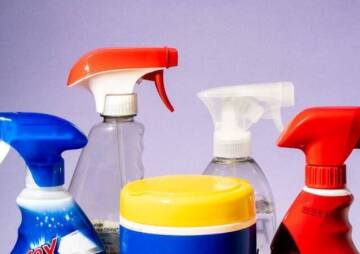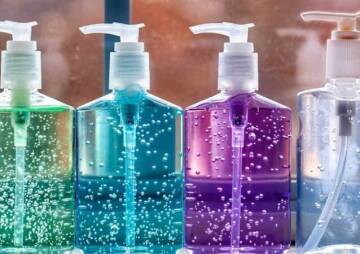-
Category
Craniomaxillofacial Surgery
Orthopedic Surgery
Spine Surgery
Orthopedic Implants
Hip Surgery
Knee Surgery
Pectus Excavatum
Bone Graft
Disinfectants
Healthcare
Do disinfectants expire?

...
Whenever the active ingredient in hand sanitizer drops below 95 percent of the stated amount on the bottle, the expiration date has arrived," says Robert Williams, a family doctor."
With the onset of the cold season, and of course, despite the corona pandemic, the use of disinfectants is increasing every day. In the early period of Covid-19, all countries faced a shortage of disinfectants and preservatives such as masks and shields. In those days, people flocked to the stores and filled their shopping carts with hand and surface disinfectants and the like, which many are unlikely to use still. But do these disinfectants not expire? Are they still usable? Isn't it dangerous to use them after all this time?
Do disinfectants, especially hand sanitizers, have an expiration date?
There are two types of hand sanitizers. One is alcohol-based, and the other alcohol-free. These days, more and more alcoholic hand sanitizers are used with more than 70% alcohol content. As you know, alcohol is a volatile substance and evaporates quickly when exposed to air. Although these alcoholic disinfectants are poured into special containers and marketed, it still cannot be said that these containers are entirely insulating. So it is always possible for alcohol to evaporate, even in small amounts. As the amount of alcohol in the solution decreases, its effectiveness decreases.
Manufacturers usually set a time limit for this effect. For example, they check when the active ingredient in the disinfectant solution falls below 90% and then set that time as the expiration date.
Robert Williams, a family doctor, and pediatrician in Lockheed, Colorado, says that whenever the active ingredient in hand sanitizer reaches less than 95 percent of the stated amount on the bottle, it has an expiration date.
How is the expiration date of the disinfectant determined?
According to FDA regulations, all disinfectants must have information about the date of manufacture, expiration, and formulation on their bottle or container. Sometimes, it is even necessary to mention the changes in the formulation of disinfectants over time.
For example, alcohol hand sanitizers expire and usually last for three years. These materials' expiration date must be on the label of the disinfectant container or the bottom. If you do not find this date on the container for any reason, you should consider that its date is three years after the time of purchase of the disinfectant.
What is the shelf life of disinfectant?
- Most bleach-based disinfectants last for about a year. You are assuming that they are stored at a temperature of about 21 degrees Celsius. Usually, a colder or warmer storage environment affect its lifespan. But the same bleach, if opened, must be used within six months. Otherwise, they lose their effectiveness.
- Hydrogen peroxide lasts up to a year as long as it is sealed but becomes ineffective after 60 days if opened in a container.
- The lifespan of versatile glass cleaners and cleaners is about two years.
- The shelf life of cleansers with antibacterial agents is about one year.
- Laundry fluids, if sealed, begin to deteriorate after nine months, and if they are opened, the maximum shelf life is only six months.
- The shelf life of air freshener sprays is two years.
- Floor polishes and disinfectants should be used within six months. Of course, if they do not open, they can last up to two years.
In general, it can be said that most cleaning and disinfecting solutions can be used for up to two years. After these two years, issues related to the stability of chemicals arise in them, and the materials are degraded and decomposed and have a negative impact.
Why do disinfectant products expire?
Disinfectants lose their strength or are destroyed over time. This process occurs gradually and usually has no specific symptoms. That is, it is not in a way that the product can be damaged by changing the smell or color. The product may even have the same shape and color but no longer have the necessary effect. How disinfectants are stored plays an essential role in their shelf life. If, for example, an alcohol disinfectant bottle is regularly opened, the alcohol evaporates, and the solution will no longer be effective.
Can you use expired disinfectant?
Manufacturers of disinfectants should include all protocols related to the product's strength, quality, and purity. Also, information about changing these materials after the expiration date should be written. The manufacturer cannot guarantee that a disinfectant's strength after the expiration date is the same as before. Hand sanitizer, although less potent after its expiration date, still kills some germs. "It is perfectly safe to use it even after its expiration date, but it is not as effective as it used to be at killing germs," says Dr. Williams.
It is not dangerous to use hand sanitizers after the expiration date.
An expired disinfectant does not necessarily pose an immediate health risk. But it has its initial effect. For this reason, it may not kill many germs on the hand. So if you do not have the conditions to wash your hands with soap and water and use a hand sanitizer, be sure to replace the old ones with a new one.
Of course, expired disinfectants may still be somewhat effective because they still contain alcohol as the active ingredient. Even if this alcohol concentration is below its original percentage, the use of this product, although less effective or perhaps ineffective, is not dangerous.
Do Nano Silver disinfectants also expire?
Another part of disinfectants is non-alcoholic types. Disinfectants are especially suitable in hospital settings that require high consumption of disinfectants. Because of these conditions, the strong smell of alcohol causes allergic reactions. But since the antibacterial activity of silver nanoparticles (AGNP) has been thoroughly proven. They can be a great alternative to alcoholic disinfectants.
One of the best features of this disinfectant is that due to the lack of alcohol, its effectiveness does not decrease over time, and it can be said that it doesn't expire and always has a constant amount of active ingredient. Nano Silver disinfectants are available in different types for surfaces, medical applications, and hands, and if you would like to know more about them, see Nano Silver disinfectants.






